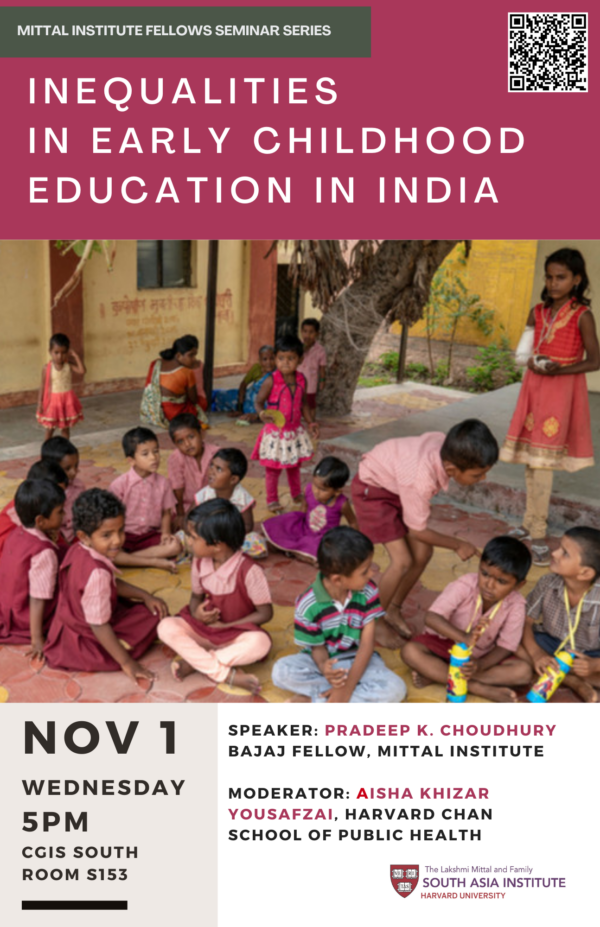The Mittal Institute welcomes you to a talk by Pradeep Choudhury, Jamnalal Kaniram Bajaj Fellow, Lakshmi Mittal and Family South Asia Institute, and moderated by Aisha Khizar Yousafzai, Professor of Child Development and Health, Harvard T.H. Chan School of Public Health.
This study examines two specific issues on early childhood education (ECE) in India: (a) to analyse the regional and socioeconomic inequalities in access to and investment in early childhood education and how a household’s socioeconomic position explains such inequalities, (b) to examine the inequalities in learning among children with differential provisioning and exposure of ECE in India. We use three major datasets for our analysis: India Human Development Survey (IHDS), National Statistical Office (NSO) education round data, and Annual Status of Education Report (ASER) data. We find considerable regional (rural/urban) and socioeconomic inequalities in access to early childhood education in India – girls and children belonging to historically disadvantaged social groups (scheduled castes and scheduled tribes) are less likely to attend early childhood education, particularly in rural areas. We find a considerable positive association between ECE and children’s learning in India, with a greater effect on English language skills than math and reading skills. We discuss the implications of our findings on the universal provisioning of quality ECE in India, a target laid down in the National Education Policy 2020.
Pradeep Choudhury has been working as an Assistant Professor of Economics at Zakir Husain Centre for Educational Studies, School of Social Sciences, Jawaharlal Nehru University (JNU), India, since 2015. He works in the area of applied development economics, with a specific focus on education. Much of his work harnesses the empirical relationship between education and development using large household and institutional data sets in developing economies. His recent work has centered on understanding the changing relationship between education and inequality in India, specifically finding out the effect of the growing private sector presence.
He has international research collaborations with the World Health Organization (WHO), Stanford University and Centre de Sciences Humaines (CSH) in the area of education, health and development. The most recent collaboration with CSH looks at the gender inequalities in scientific careers among engineering and medicine graduates in India, funded by Chair for Women and Science, Paris, France. Several of his works have appeared in peer-reviewed journals like Proceedings of the National Academy of Sciences, International Journal of Educational Development, Economic and Political Weekly, Asia & the Pacific Policy Studies, Millennial Asia, Indian Journal of Human Development, Journal of School Choice, Social Change, Journal of Social and Economic Development, Journal of the Asia Pacific Economy, International Journal of Child Care and Education Policy, and Review of Development and Change. His co-edited volume titled Contextualising Educational Studies in India: Research, Policy and Practices was published by Routledge in 2021. His forthcoming book project (with Prof. Satvinderpal Kaur, Panjab University) for Routledge examines how COVID-19 pandemic has impacted access, inclusion and learning (in both school and higher education) in India. This work problematizes the state’s response to the education crisis, outlines strategies to minimize disruptions in the education sector and builds a resilient education system in India.

